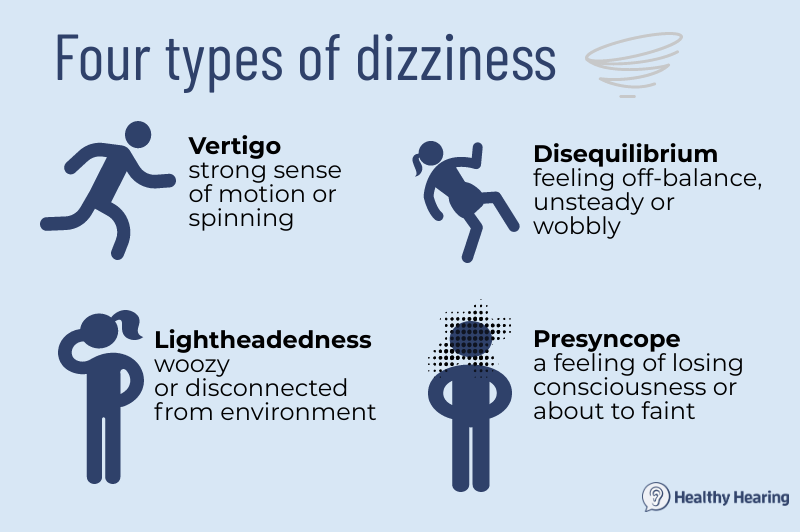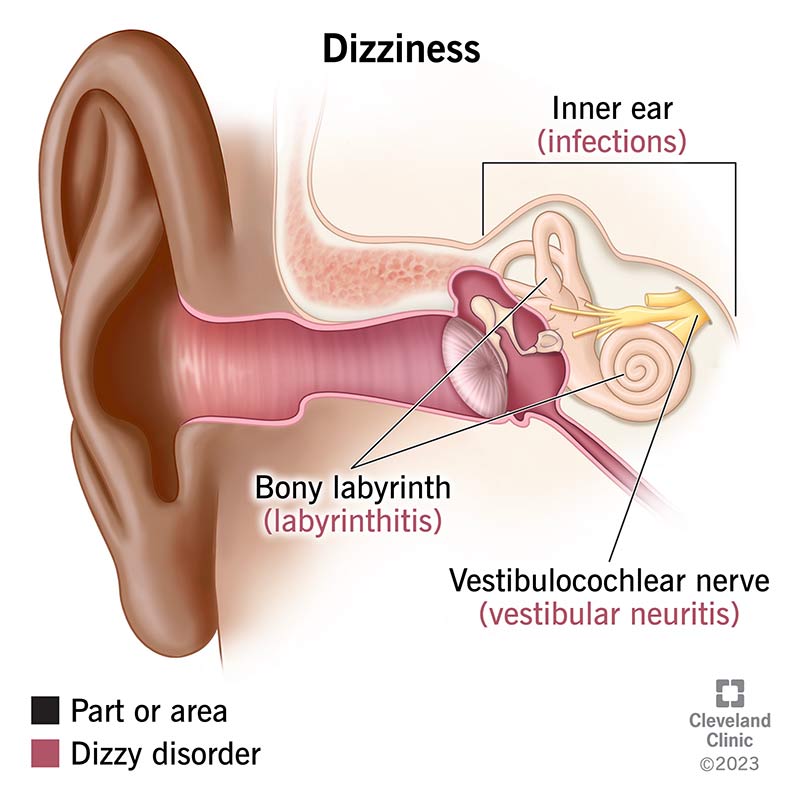
Vertigo is a subjective sensation when surrounding objects seem to move or rotate, or when there is a feeling of instability, oscillation. It is important to emphasize that dizziness is not a disease, but a symptom that can occur for many different reasons.
The first type of dizziness, vertigo, occurs when everything seems to be spinning around you. Vertigo is often caused by disorders of the vestibular system, such as Ménière's disease, benign paroxysmal positional vertigo (BPPV), and vestibular neuritis. The vestibular system, which includes brain structures and ear structures, regulates balance and the perception of spatial orientation.
Another type of vertigo, disorientation, is the feeling of losing your balance or feeling unsteady. It can be caused by blood pressure problems, medications, infections, or even nervous system diseases such as stroke or Parkinson's disease.
Finally, you may feel like you're about to faint. It can be caused by hypotension, anemia, dehydration or heart problems.
Although vertigo is often painless and short-lived, some cases can be life-threatening and require immediate medical attention. Therefore, if your dizziness lasts for more than a few minutes or if it is accompanied by other symptoms such as an intense headache, slurred speech, impaired coordination or fainting, you should see your doctor immediately.
What causes dizziness?
Dizziness is a common symptom that has many causes and can vary from person to person. Dizziness can be caused by impaired function of the inner ear, where the balance-regulating vestibular system is located. It can be caused by a variety of vestibular disorders, such as benign paroxysmal positional vertigo (BPPV), Meniere's disease, or vestibular neuritis.
Other causes of dizziness may be related to disorders of the nervous system. For example, diseases of the brain or spinal cord, such as multiple sclerosis, Parkinson's disease, or stroke, can cause dizziness. It can also result from trauma to the brain, which can damage nerves or brain structures responsible for balance and spatial orientation.
In addition, dizziness can be caused by disorders of the cardiovascular system, for example, fluctuations in blood pressure. Hypertension (too high blood pressure) or hypotension (too low blood pressure) can cause insufficient blood supply to the brain, which can cause dizziness.
Some medications can also cause dizziness as a side effect. These include certain antidepressants, anti-epileptic drugs, sedatives, and some blood pressure medications.
Due to these various reasons, dizziness is very common. According to the World Health Organization, about 20-30% of adults experience dizziness during their lifetime. Although this number may vary between different populations and age groups, dizziness is one of the most common symptoms in both primary and specialty care settings.
Dizziness can be a health hazard
The first type of dizziness, vertigo, is usually associated with problems with the vestibular system and can manifest as a feeling as if the environment is spinning around you or as if you are spinning. It can be accompanied by other symptoms such as ringing in the ears, headache, nausea, vomiting and sweating.
Feeling unsteady is another type of vertigo. It often manifests itself as a feeling of losing your balance, of not feeling stable on your feet. It can be related to nervous system problems, cardiovascular problems or medication.
Dizziness can cause a feeling of faintness or weakness. This can be due to changes in blood pressure, heart problems, or blood vessel problems.
Dizziness can pose a health risk, especially if it occurs along with other symptoms. Some of these risks include:
Trauma. Dizziness can cause loss of balance and lead to falls that can cause injury.
Medical conditions. Sometimes dizziness can be a symptom of serious medical conditions, such as a stroke, brain tumor, or heart disease.
Quality of life. Dizziness can interfere with daily activities such as driving, working or playing sports.
Diagnosis and treatment methods
Diagnosing vertigo often begins with a detailed patient history and clinical examination. Your doctor may ask about the nature of your symptoms, how long they last, what causes them, any previous medical conditions or medications you are taking. A physical exam may include an ear, eye, heart, and blood pressure check.
Due to the complexity and many possible causes, vertigo may require additional diagnostic tests. This may include:
Vestibular studies. These are tests to determine whether the problem is with the middle ear or the brain structures responsible for balance. For example, electronystagmography (ENG) or videonystagmography (VNG) can be used to assess eye movements in response to balance.
Brain imaging studies. Computed tomography (CT) or magnetic resonance imaging (MRI) may be used to visualize the brain and detect any structural changes, such as brain tumors or stroke, that may be causing dizziness.
Cardiovascular studies. These tests, such as an electrocardiogram (ECG) or blood pressure measurements, can be used to investigate whether cardiovascular problems may be causing dizziness.
Audiological studies. These tests can be used to determine if vertigo is related to hearing problems.
The goals of treating vertigo are to reduce symptoms, treat the underlying disease, if present, and improve quality of life. Treatment may vary depending on the cause of the dizziness. This may include:
Medicines. Medicines such as antiemetics, antihistamines or benzodiazepines can be used to reduce the symptoms of dizziness.
Physical therapy. Vestibular rehabilitation is a form of physical therapy designed to improve balance and reduce symptoms of vertigo. This may include exercises to improve coordination, balance and eye movements.
Surgery. In some cases, if vertigo is related to middle ear problems, surgery may be recommended.
Change your medication or lifestyle. In some people, dizziness can be caused by certain medications or lifestyle factors, such as alcohol consumption or dehydration. In such cases, changes in medication or lifestyle habits may be helpful.
It is always important to remember that dizziness is a symptom, not a diagnosis. Therefore, it is important to see a doctor for any persistent or recurring dizziness so that any underlying causes can be identified and treated.

What to do when you feel dizzy?
When you start feeling dizzy, it's important to stay calm first. Although it can be a frightening sensation, many cases of vertigo are not related to serious health problems. Here are some tips on what to do when you start feeling dizzy:
Lie down or sit up. If you are not driving and on foot, lie down or sit down to prevent falling and injury if you lose your balance.
Drink water. Dehydration can cause dizziness, so drink some water to make sure you're hydrated enough.
Breathe slowly. Deep and slow breathing can help reduce stress and improve blood flow to the brain, which can help reduce dizziness.
Avoid sudden movements. Sudden movements, especially standing up suddenly or turning your head, can cause dizziness. Avoid such sudden movements.
Consult your doctor. If your dizziness is severe, long-lasting, recurring, or accompanied by other symptoms such as nausea, vomiting, ear pain, headache, impaired hearing or speech, then you should see your doctor immediately.
Don't drive. If you feel dizzy, avoid driving or other activities that could put you or others at risk if you lose your balance.
These tips can help you deal with vertigo, but it's important to remember that it's only a temporary solution. Dizziness can be caused by a variety of reasons, so it is important to consult a doctor to determine the cause and, if necessary, begin appropriate treatment.
Sources of information:
Staab JP, Ruckenstein MJ. Which Comes First? Psychogenic Dizziness Versus Otogenic Anxiety. Laryngoscope. 2003
Strupp M, Brandt T. Vestibular neuritis. Semin Neurol. 2009
Kelman L. The triggers or precipitants of the acute migraine attack. Cephalalgia. 2007
Pavlou M, Lingeswaran A, Davies RA, Gresty MA, Bronstein AM. Simulator based rehabilitation in refractory dizziness. J Neurol. 2004
Tanaka H, Dinenno FA, Monahan KD, Clevenger CM, DeSouza CA, Seals DR. Aging, habitual exercise, and dynamic arterial compliance. Circulation. 2000
Hoffman RM, Einstadter D, Kroenke K. Evaluating dizziness. Am J Med. 1999
Bisdorff A, Von Brevern M, Lempert T, Newman-Toker DE. Classification of vestibular symptoms: towards an international classification of vestibular disorders. J Vestib Res. 2009
# galvos svaigimas # svaigimas







